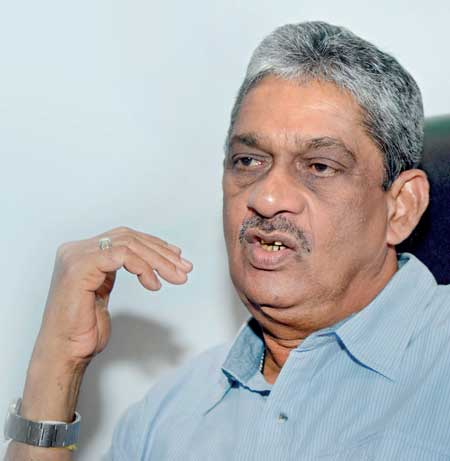Reply To:
Name - Reply Comment

Field Marshal Sarath Fonseka, the newly appointed Member of Parliament, took oaths yesterday under the UNP’s’ elephant symbol to fill in the national list position left vacant following the passing
away of the late Minister M.K.A.D.S. Gunawardene. In a candid interview with the Dailymirror, Field Marshal Fonseka expressed his views on the appointment, his eligibility to be an MP and his political
career so far. Excerpts:

QWhy did you initially want to join politics?
I was not happy with the way the country was moving forward. The person in the Presidential seat was abusing power and carried out a rather undemocratic process. Therefore I decided to step forward and serve justice to the country. I was close to victory and I know that I was able to make some impact.
Q Do you think you made the right decision?
I have been a person who sacrificed my life for the sake of the country. Therefore, when the country was in bad hands I couldn’t just look away. I knew it would be a dangerous step but, I was ready to risk myself. As a result we were able to throw out the Rajapaksas. If we didn’t take that initial step, he would have been the President for another 10 years.
QNow that you have been elected to Parliament from the national list, weren’t there any objections from your party for this decision?
Everybody in my party was for this decision because I will be filling in the position, which became vacant with the demise of Minister Gunawardene.

Q However, Article 91 of the Constitution says that if somebody is serving in the regular force of the Army, Navy or the Air Force, it disqualifies that person from becoming an MP. How do you see this?
One can serve in the position of Field Marshal until death. I don’t bear any responsibility for anything that happens in the Army. Therefore, I have the democratic right to do politics.
Q Can you elaborate?
According to world military traditions, the post of Field Marshal is an honorary post, which is uniform for life. He is entitled to a staff, residence, medical assistance and transport. But, in my case these are still in the process of being Gazetted.
Q Article 34 states that if a person had served a conviction during the preceding seven years that person would not be eligible to be in Parliament. What are your views about this as a person who was bailed on a Presidential pardon?
There is nothing like that. If somebody is given a Presidential pardon then from there onwards he can live like any other normal citizen.
Q What was included in the MoU, signed between you and the UNFGG?
We have included certain principles addressing good governance, reconciliation, human rights and democracy. Therefore we will be working in accordance to these principles without abusing or misusing power.
Q You contested the elections under the Democratic Party (DP) and now you ended up in the UNFGG. Is it another defection as people would see?
I started politics with a number of parties, such as the UNP, JVP and even the TNA. I wanted to spread a message around and in order to gain proper freedom people should always choose representatives, who are doing ‘good politics’. I was in the Democratic Party for three years but the reason why I joined the UNFGG is to ensure that the Rajapaksas will not raise their head again.
Q...Do you see them as a threat?
If they raise their head again, there would be a threat to President Sirisena and it will be a huge threat for the entire country as well. Therefore in order to complete this task I have to be a UNPer and therefore I decided to join the UNFGG.
Q At the time of your imprisonment, you were General Fonseka. Don’t you think that this imprisonment defamed you?
I didn’t get imprisoned for taking benefits, perks or privileges. I was not involved in corrupt practices. By the time I was given the pardon I still had two more years to go. Therefore I don’t think it really had an impact on my status.
Explaining the powers involved in the post of Field Marshal, Fonseka stated that it is second to only the President and the Prime Minister. Following are excerpts of an interview published in our sister paper Sunday Lankadeepa:
Q When you contested the elections you opposed both the SLFP and the UNP. But today you are a member of the UNP. Are you not distorting the democracy?
I don’t believe that all those elected through an election are eligible to be politicians. People vote for parties and colours and therefore the filtration process is not that pure. Although I lost I strongly believe that I served justice to the country more than the people who won.
That service is greater than the so-called service rendered by those who got into Parliament through the shadows of their parties and colours. Therefore I don’t think that I being in Parliament would bring any negative impact on the people. If such an injustice is going to take place I will not sit in Parliament.
Q Don’t you have plans to be a President or a Prime Minister again?
I didn’t have such dreams anyway. I had the same goal then as well. If the country is moving in the proper direction then I can retire from politics and stay at home. I didn’t contest the Presidential Election to enjoy the perks. My only goal was to bring about a change in this country. I want to ensure that the people in this country have the freedom of living and this is why I joined politics and will always work towards achieving it.
Q You are the only Field Marshal in the country. Is it a position above all other Ministerial posts?
This is an honorary position according to worldly traditions. Therefore according to that a Field Marshal is a position that is only second to the President. That means that a Field Marshal is a senior position to that of Ministerial post.
Q What about the Prime Minister?
In some countries the Prime Minister is the head of State and in certain other countries it is the President. I don’t think that anybody can be more senior than a Prime Minister according to the country’s political criteria. But the post of Field Marshal is always senior to other Cabinet Ministers.